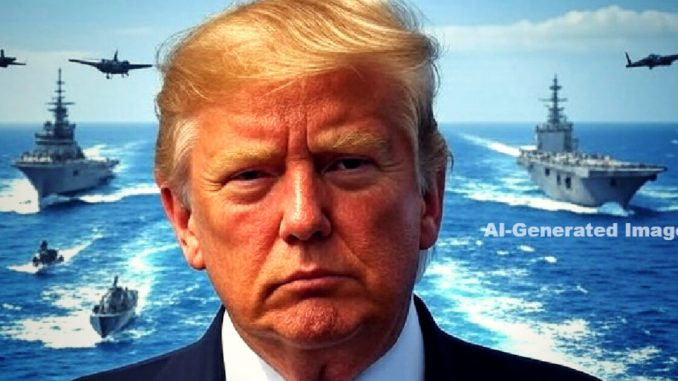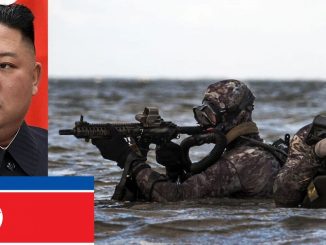
AI-generated image by Grok – Is Trump about to seize Venezuelan ports and airfields?
Published October 5, 2025
Trump’s memo to Congress grants him wartime powers to strike, kill, and detain cartel fighters without trial
In October 2025, reports from multiple outlets suggested a dramatic escalation in U.S.–Venezuela tensions. According to these accounts, the United States is allegedly tightening a siege around Venezuela, deploying warships, F‑35 stealth jets, submarines, and thousands of Marines to the region. The purported objective: to target narco-trafficking operations and, in a controversial move, designate drug cartels as “unlawful combatants,” framing the situation as an armed conflict.
The reports also claim that the U.S. may be preparing to seize key Venezuelan ports and airfields, signaling an unprecedented level of military posturing near the country’s coast. Venezuelan President Nicolás Maduro dismissed these accounts as “Hollywood stories,” insisting that Washington is exaggerating the threat to justify potential intervention.
Whether fully verified or partly speculative, these developments highlight the tense intersection of national security, anti-narcotics operations, and geopolitical maneuvering. The story has captured international attention, raising questions about sovereignty, regional stability, and the broader implications of U.S. military action in Latin America.
America’s military is preparing to seize ports and airfields in Venezuela
US Marines unload from an Osprey V-22 aircraft in Puerto RicoCredit: AFP
 Public / Political Reactions
Public / Political Reactions
1. U.S. Political Sphere
-
Proponents of strong action: Some lawmakers and conservative commentators applaud the show of force, framing it as a necessary stance against narco-terrorism and a demonstration of U.S. resolve in Latin America.
-
Critics and skeptics: Progressive and centrist voices caution against overreach, warning that military posturing could trigger unnecessary conflict, harm civilians, and damage U.S. credibility internationally.
-
Bipartisan concerns: Both sides express interest in monitoring Congressional authorization for military activity, ensuring that any escalation follows legal and constitutional procedures.
2. Venezuelan Government
-
President Nicolás Maduro publicly condemned the alleged U.S. maneuvers, calling them “Hollywood stories” designed to justify intervention.
-
Venezuelan officials may use the narrative of foreign aggression to rally nationalist sentiment and consolidate internal support, framing the U.S. as a destabilizing force.
3. Regional and International Reactions
-
Latin American neighbors: Countries like Brazil, Colombia, and Caribbean nations express concern about regional stability, urging diplomacy over unilateral action.
-
International community: The UN and other global organizations emphasize respect for sovereignty and caution against escalating military tensions in the hemisphere.
4. Public Opinion & Media
-
Sensational reporting by partisan outlets fuels debate, with some audiences perceiving the U.S. posture as decisive leadership, while others view it as provocative overreach.
-
Social media reactions show a polarized mix of fear, support for anti-cartel operations, and criticism of potential military adventurism.
 Resulting Effects
Resulting Effects
1. Regional Security Instability
-
Increased U.S. military presence near Venezuela could heighten tensions across the Caribbean and northern South America.
-
Neighboring countries (Colombia, Brazil, Caribbean islands) may ramp up their own military readiness or request U.S. assurances, raising the risk of miscalculation or accidental clashes.
2. Venezuelan Internal Strain
-
Maduro’s government may further consolidate power, using the narrative of foreign aggression to justify crackdowns on political opposition and dissent.
-
Civilian anxiety and unrest could escalate, potentially triggering migration waves toward neighboring countries.
3. Cartel & Drug Trade Disruption
-
If the U.S. successfully targets cartel operations, short-term disruption of drug trafficking routes could occur.
-
However, historical precedent shows that cartels often adapt quickly, moving operations to more remote or clandestine areas, or forming new alliances.
4. Economic Consequences
-
Venezuelan economy, already fragile, could suffer further from potential port blockades, trade disruptions, and increased sanctions.
-
Regional trade, particularly in petroleum and basic goods, may be disrupted, affecting both Latin American markets and global commodity prices.
5. Diplomatic Fallout
-
The perception of U.S. aggression could strain relations with regional governments and international organizations.
-
It may complicate U.S. efforts to build coalitions for other global initiatives, including anti-drug or anti-terrorism campaigns.
6. Domestic Political Ramifications in the U.S.
-
U.S. public opinion could polarize: some may support a tough stance on drugs and Maduro, while others may decry potential overreach and war risks.
-
Congress may face pressure to approve or constrain funding for operations, affecting broader U.S. defense and foreign policy agendas.
7. Media & Information Impact
-
Sensationalized reporting, especially from partisan outlets, could amplify fear and speculation, influencing public perception before facts are verified.
-
Misinformation may complicate diplomatic communications and negotiations, potentially escalating tensions unintentionally.
 Future Outlook
Future Outlook
1. Escalation vs. Containment
-
If U.S. military posturing continues without clear diplomatic engagement, there is a risk of escalation into open conflict, whether intentional or accidental.
-
Conversely, sustained pressure may lead Venezuela to seek negotiations or limited concessions to avoid confrontation, especially if regional actors mediate.
2. Impact on U.S.–Latin America Relations
-
Long-term trust between the U.S. and Latin American nations could erode, particularly if Washington is perceived as using the war on drugs as a pretext for intervention.
-
Countries like Brazil, Colombia, and Mexico may push for multilateral frameworks to counterbalance U.S. unilateral action.
3. Cartel Adaptation and Criminal Networks
-
Cartels are likely to adapt to U.S. pressure by shifting routes, increasing secrecy, or forming new alliances.
-
Any short-term gains in curbing narcotics flow could be offset by long-term resilience of criminal networks.
4. Political Landscape in Venezuela
-
Maduro could leverage U.S. pressure to strengthen nationalist narratives, consolidating power and portraying himself as a defender against foreign aggression.
-
Opposition forces may struggle to gain traction if foreign intervention fears dominate public discourse.
5. Global Perception of U.S. Military Policy
-
Continued aggressive posture may influence global perceptions of U.S. foreign policy, signaling a willingness to engage militarily over illicit drug trafficking or regime-related disputes.
-
Allies and rivals alike will monitor the balance between counter-narcotics objectives and respect for sovereignty, potentially reshaping regional alliances.
6. Potential for Diplomacy and Mediation
-
A coordinated international response, involving the UN or OAS, could de-escalate tensions, using diplomatic channels to address both cartel activity and U.S.–Venezuelan standoffs.
-
Success depends on transparent communication, credible threat management, and multilateral engagement rather than unilateral action.
 Bottom Line:
Bottom Line:
The reports of U.S. military positioning near Venezuela—though unverified in mainstream sources—highlight a decisive, proactive approach to combatting narco-trafficking and safeguarding American interests. Whether or not a direct intervention occurs, the message is clear: the United States is signaling it will not tolerate threats to national security emanating from the Western Hemisphere.
From a strategic standpoint, assertive posturing may deter cartels, protect U.S. borders, and demonstrate resolve to regional allies. Critics may decry the rhetoric as provocative, yet history shows that firm displays of strength often prevent larger conflicts.
Ultimately, the situation underscores a fundamental principle: defending national security and enforcing the rule of law abroad requires both vigilance and readiness. While diplomacy remains essential, there is no substitute for credible deterrence in a region where chaos and criminal enterprises have long flourished.
SOURCES: THE GATEWAY PUNDIT – US Tightens the Siege Around Venezuela – Military Reportedly ‘Preparing To Seize Ports and Airfields’ After Trump Declares Full-Scale War on Drug Cartels’ ‘Unlawful Combatants’
THE UK SUN – GOING TO WAR US military ‘preparing to seize ports & airfields’ in Venezuela as Trump declares full-scale war on drug cartels








Be the first to comment